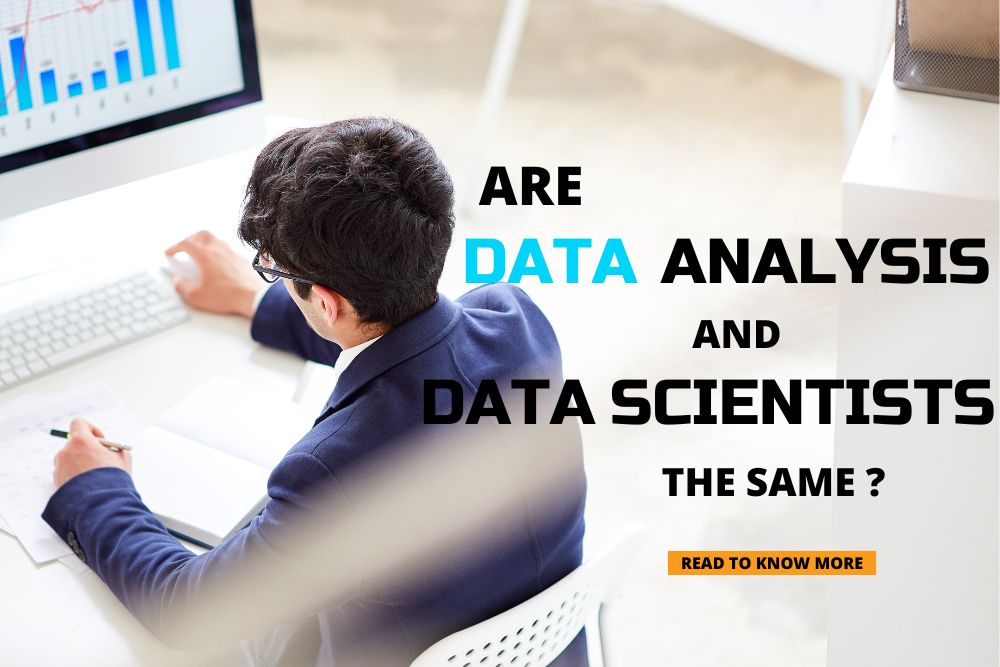Data scientists and Data analysts are two popular positions in the IT industry that deal with data. Although there are similarities between the jobs and many of the related work duties, they are not the same.
So, what makes a Data scientist different from a Data analyst? Do the responsibilities and skill sets differ? What are the expected incomes and employment prospects of the two career choices? We will cover a wide range of topics in this article, including definitions, careers, and the differences between Data scientists vs. Data analysts.
In the booming world of data, two titles consistently stand out: the data analyst and data scientist. While they sound similar and often collaborate, their core functions and career paths are distinctly different. This common confusion between data analysts vs data scientists can be a major hurdle for aspiring professionals trying to map out their future. Understanding these nuances is the first critical step toward a successful career. For those ready to build a strong foundation in analytics, exploring dedicated programs like our Data Analyst Courses In Pune provides the essential skills to get started. This article will demystify the data analyst vs. data scientist debate, examining their unique responsibilities, skill sets, andsalary expectations to help you make an informed decision.
Beyond the Job Title: Comparing Skills, Salaries, and Career Paths
A data scientist works in organizations doing more than just analyzing data to forecast trends, developing products based on data, and developing complex algorithms to solve challenging issues. This is a thorough explanation of the typical tasks performed by data scientists:
- Data Management and Collection: Similar to data analysts, data scientists gather information from many sources, but they frequently work with more extensive and more intricate datasets, which may include unstructured information such as text, photos, or video. In order to enable adequate data access and security, they also manage and supervise the design of databases and data storage.
- Advanced Data Analysis: Compared to data analysts, data scientists employ more sophisticated statistical and machine learning methodologies. In order to automate procedures or forecast future trends, they use predictive models that leverage machine learning.
- Create Algorithms and Models: Creating algorithms that can swiftly and effectively handle and analyze massive volumes of data is one of the primary duties of data scientists. These algorithms support the creation of judgments and recommendations based on data.
- Data Visualization and Communication: Data scientists also produce representations, although these are frequently more intricate and interactive, intended to assist stakeholders in comprehending the results of complicated data linkages or machine learning models. A critical aspect of their work is communicating their discoveries frequently to a non-technical audience.
- Product Development and Improvement: Data scientists work closely with product teams to integrate data-driven decision-making into products, services, or processes. This may entail creating unique analytics tools, creating automated methods for making decisions, or improving product features in light of data insights.
- Artificial Intelligence & Machine Learning: They are experts in these domains and employ these technologies to create systems that can perform tasks that often need human intelligence. These include image identification, natural language processing, and market forecasting.
- Research and Experimentation: Data scientists frequently research to evaluate experimental data and test hypotheses. This may entail conducting controlled studies and using fresh approaches to statistics and machine learning.
- Cross-functional Collaboration: To make sure that the insights and models they provide are successfully incorporated into the business operations, they regularly work with teams from many departments inside an organization, such as engineering, operations, marketing, and senior management.
What Do Data Analysts Do?
Any organization that works with data needs to have a data analyst on staff. Below is a summary of the typical tasks performed by data analysts:
- Collect Data: Data analysts collect data from a variety of sources, including publicly accessible data, market research, internal databases, and client feedback.
- Process Data: They make sure the information is correctly cleaned and formatted, eliminating any errors or redundant information. Maintaining accuracy may entail managing big databases and applying data-cleansing techniques.
- Analyze Data: Data analysts interpret the data to find trends, patterns, and linkages by using statistical tools and procedures. Predictive modeling techniques, statistical analysis, and forecasting may be required for this.
- Data Visualization and Reporting: Data visualization tools like graphs, charts, and dashboards help analysts make their findings easier to grasp. These visuals aid stakeholders in making defendable choices based on data analysis.
- Make Recommendations: Data analysts utilize their results to deliver stakeholders relevant, actionable insights and suggestions. This could be making recommendations for how to streamline procedures, boost output, boost productivity, or cut expenses.
- Utilize Tools and Software: Data analysts are skilled in using specialized tools and software, such as Excel for spreadsheets, SQL for database management, and more sophisticated tools like R or Python for statistical analysis and data visualization tools like Tableau or PowerBI.
- Collaborate with Others: To make sure that the insights obtained from the data are in line with business objectives and demands, they frequently collaborate closely with teams from other departments inside the company, including marketing, finance, and operations.
Data Scientists and Data Analysts: Differences and Similarities
Data scientists and analysts perform essential but distinct roles in an organization. The following are some ways they can collaborate on the same dataset or project:
- A data analyst writes reports and does routine analysis to make sense of the data that already exists. A data scientist creates new methods for gathering, storing, processing, and analyzing data.
- A data analyst seeks to provide answers to inquiries pertaining to business. A data scientist aims to create novel approaches for posing and responding to such queries.
- A data analyst needs database software, business intelligence programs, and statistical tools. A data scientist works with Python, Java, and machine learning to handle and analyze data.
Regardless of the path you choose, keep in mind that both positions might necessitate at least a bachelor’s degree in a quantitative field, such as statistics, computer science, or mathematics. If you enjoy working with numbers and computer programming, you might be a data scientist or analyst and gain insightful knowledge for your company.
Data Science vs. Data Analytics: Qualifications
The majority of data analyst jobs typically call for a bachelor’s degree holder with a background in statistics, computer science, or data analysis. Typically, candidates for data science positions need to have a bachelor’s degree in the field and a master’s degree in a related field. Among the acceptable specializations are:
- Cloud-based computing
- Cybersecurity
- Networking
- Steganography
Beginning your job as a data analyst might be a great approach to start your journey as a data scientist. Obtaining professional certificates or enrolling in pertinent IT courses can also help you strengthen your resume and highlight the qualities that companies look for in candidates for jobs in this industry.
Data Skills for Data Scientists and Data Analysts
Although they both work with data, data scientists and data analysts have slightly distinct tools and skill sets. Data analysts and data scientists use many of the same skills. This is a contrast between the two.
| B2B | B2C | |
| What is it? | Selling to organizations’ decision-makers | Advertising to specific customers |
| Examples of Products | Co-working locations, office supplies, equipment, and software | Food, clothes, gadgets, publications, and media subscriptions |
| Examples of Services | Product distribution, site or graphic design, consulting and training, and ad campaign management | Tutoring, hairdressing, medical attention, housekeeping, and auto maintenance |
| Purchasing motives | Logic: What is an investment’s financial return on investment? What degree of experience does a service provider have? | Emotions: Will this item satisfy a need or an issue? |
| Cycle of sales | Prolonged sales cycle due to decision-makers focus on ROI | Reduced time between purchase and payment, particularly for impulsive buys |
| Emphasis on market research | Decision-makers’ psychographics and business firmographics | Individual customer demographics and psychographics |
Comparing Data Scientists and Data Analysts: Education and Experience
Education:
Data Analysts:
- Degree Requirements: If you want to work as a data analyst, you usually need a bachelor’s degree in a field like economics, computer science, statistics, or mathematics.
- Relevant Courses: Statistics, data management, and basic programming abilities are among the topics covered in their courses. It is typical to have some experience with tools like Excel and SQL, as well as computer languages like R or Python.
Data Scientists:
- Degree Requirements: Data scientists usually require a more advanced degree, like a master’s or PhD, for roles demanding more technical or research-intensive activities. Study areas are comparable to those for data analysts, although they go deeper into computer science, engineering, or data science.
- Relevant Courses: Part of their curriculum in Data Science we includes advanced statistics, ML, programming, data management, and, often, AI classes. Expertise in big data technologies (Hadoop, Spark), advanced analytics, machine learning frameworks, and programming languages (Python, R, Scala) is required.
Work Experience
Data Analysts:
- Entry-Level Positioning: After completing their undergraduate degrees, many data analysts are able to begin their careers right away. Statistical analysis, data processing, and cleansing may be the main focuses of entry-level positions.
- Skill Development: As they have more experience, they can be given greater responsibility, including creating intricate models or picking up new data visualization software like Tableau or PowerBI.
Data Scientists:
- Advanced Start: Data scientists often need a bachelor’s degree or more to break into the industry, and they must have experience or training in complex data processing and machine learning. Stepping stones can be fellowships, internships, or pertinent academic projects.
- Career Progression: Early in their careers, they should be able to manage more complex projects and create novel goods or methods. Their capacity to learn new material on a regular basis and remain current with advances in artificial intelligence and machine learning is another essential factor in their success in the workplace.
Career Path: Data Scientist vs. Data Analyst
It is crucial to comprehend the employment options and pathways accessible for Data science vs Data analytics in order to consider a career in either field.
What Is a Data Analyst’s Typical Career Path?
A typical career path for a data analyst starts with entry-level employment as a data entry clerk or research assistant and advances to junior data analyst or business intelligence analyst roles. As they gain expertise and competence, they could become senior data analysts or hold leadership roles like business analysts or data architects. For job progression in this field, skill improvement and ongoing education are essential. we offer comprehensive learning in Data Analytics, helping you stay updated on the latest trends and job opportunities in the industry.
What Is a Data Scientist’s Typical Career Path?
The initial jobs in the field of data science are research assistants or junior data scientists. There are higher-level opportunities for data scientists and senior data scientists. They can work as directors of data science or machine learning engineers as they gain more expertise and specialize in areas like big data and machine learning.

How to Become an Expert in Data
Here are some strategies for entering the fascinating world of data.
Where To Begin
If you want to work in business analytics or data science, starting can be intimidating, but there are a few essential measures you can take to help you along the way.
The Path to Data Analyst
Either obtain a relevant degree—computer science, statistics, or mathematics are popular options—or finish a data analytics 3RI Technologies course in order to become an experienced data analyst. Building experience through personal projects or internships is also beneficial for creating a portfolio and acquiring in-demand abilities.
As you continue your dedication to professional growth and continued education, make sure you become proficient in data visualization tools like Tableau or Power BI and programming languages like SQL, Python, and R.
The Path to Data Scientists
Typically, being a data scientist requires you to have finished an advanced degree in a relevant discipline, such as math, statistics, or computer science, or to have attended a data science 3RI Technologies course.
Creating a portfolio of ones own work, connecting with other data professionals, and locating a mentor in the industry can all be helpful in gaining experience and finding employment.
The Bottom Line
Ultimately, your interests and aptitudes will dictate whether you want to work in Data science or Data analysis. Data science may be the appropriate career choice for you if you appreciate exploring the depths of machine learning and predictive modeling and are drawn to more complex, algorithmic problems. It calls for a solid grasp of complex statistics and good programming abilities.
However, suppose you would focus less on intricate algorithms and heavy coding and more on uncovering compelling insights from data and compellingly presenting them. In that case, Data analysis might be a better fit for you. While learning statistical analysis, data manipulation, and visualization techniques is part of this curriculum, it typically does not require as much programming knowledge as data science. Making a decision based on your professional aspirations, enthusiasm for technological innovation, and arithmetic aptitude assessment will be helpful.
FAQ
1.Which degree is superior, data science or data analytics?
Your job and personal goals will determine which degree is best for you. If you are interested in statistical modeling and data processing, a degree in data analytics might be perfect for you. If you are interested in big data or machine learning, you might want to consider getting a degree in data science.
2. Can an analyst of data become a scientist of data?
Jobs for data scientists and analysts can sometimes overlap, which can be advantageous when switching between positions. Continually learning and gaining experience is one of the best methods to stay up to date with your education and develop relevant abilities.
3. Is coding a requirement for a data analyst job?
The needs of the company, the chosen approaches, and the post’s seniority will all influence the criteria for a data analyst role. While some data analysts may require strong Excel or data software abilities, others may need to code as part of their daily work.
4. What skills are common among data analysts and data scientists?
Math, statistics, data mining, data warehousing, and data visualization are among the common talents shared by data scientists and analysts. R and Python are two programming languages that certain data analysts may utilize, depending on their position within a company.
5. How much does a data scientist make compared to a data analyst?
The BLS reports that the median pay for data scientists was $108,020 in 2023. Data analysts’ salary, according to the BLS, was $83,640 in 2023 .



